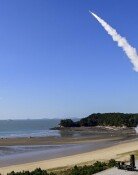Too early to resume operation of inter-Korean industrial complex
Too early to resume operation of inter-Korean industrial complex
Posted August. 03, 2018 09:35,
Updated August. 03, 2018 09:39
As the South Korean government is publicly expressing its hope to resume the operation of the inter-Korean industrial complex in the North Korean city of Kaesong, the U.S. administration and Congressional leaders are voicing their opposition. Senator Cory Gardner, chair of the Subcommittee on East Asia and the Pacific, said on Thursday that resuming the Kaesong Industrial Complex's operation would violate U.S. law and the UN Security Council's resolutions and be a "serious mistake." After North Korea's ruling party organ Rodong Sinmun on Tuesday called for the resumption of the Kaesong Industrial Complex and the Mount Kumgang tourism program, the U.S. Department of State reaffirmed its support of the shutdown of the Kaesong Industrial Complex. The department said, "We support the 2016 decision to shut down the Kaesong Complex in the face of (the North's) destabilizing and provocative actions,” citing concerns about the North’s "growing threat and flagrant disregard" of international sanctions.
Washington's pronouncement of such a position is meant to emphasize that there should be any economic gift to North Korea before Pyongyang takes sincere denuclearization measures at a time when North Korean leader Kim Jong Un's sincerity toward denuclearization is questioned due to recently revealed circumstances indicating the North's developing a new intercontinental ballistic missile while not responding to denuclearization talks. Also underlying Washington's position is concerns about the possibility that the South Korean government becomes too obsessed about making progress in the inter-Korean relations and step out of the international sanctions against the North.
Of course, it is unlikely that Seoul will push ahead with resuming the operation of the Kaesong Industrial Complex despite the strict U.N. sanctions against the North. Nevertheless, a spokesman for the Ministry of Unification told a regular news briefing on Wednesday that it is Seoul's position that the Kaesong Industrial Complex should resume operations "as soon as possible." The remark seems to reflect the South Korean government's urgency in producing some results from improved inter-Korean relations. Seoul appears to intend to seek inter-Korean economic cooperation to prime the pump for denuclearization. Currently, such an attitude would not produce any practical result or uphold the cause.
Inter-Korean economic cooperation should be offered in accordance with the North's sincere implementation of denuclearization measures. If the South sends a signal that it will leave a crack in the dike of international sanctions, the only means to induce Pyongyang to its denuclearization, it could cause the North to make a misjudgment and do a serious damage to the Seoul-Washington cooperation. U.S. Senator Ben Cardin said that it would be "disappointing" to see transactions that run counter to North Korea sanctions, urging Seoul to abide by the sanctions. If a wobbly Seoul-Washington coordination delays in the North's denuclearization, it would eventually cause further delays in inter-Korean economic cooperation and opening a new horizon in the inter-Korean relations.







